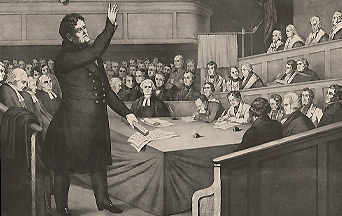
In 1829, Ireland had 6,800,000 inhabitants, of whom only 800,000 were Protestants. Nevertheless, the Catholics were obliged to pay the expenses of Anglican worship and clergy upkeep, while Catholic priests lived off the charity of the faithful. On the other hand, this poor and weather-beaten region created conditions that made it difficult for small landowners to earn enough to pay taxes. This situation forced them to surrender their land to the government. Wealthy Protestant lords then bought the land cheaply.
The Emancipation Act of 1829 was a great step toward ending this state of affairs. However, Daniel O’Connell’s movement had to take advantage of this victory. While emancipation was a successful first step that opened new opportunities in the fight for Church freedom, a change in tactics was needed. Catholics had won political rights, could vote and be voted for, and no longer had to resort to legal demonstrations to be heard. Now, they needed to repeal the laws that oppressed them. This could only happen through political and parliamentary debate.
That was the new direction the Irish leader steered his movement. He summarized the new strategy. “I will not violate the law of God or the law of men. But so long as there is a piece of the constitution, I will use it as support and leverage to sustain my country’s shaken liberties.”
 Learn All About the Prophecies of Our Lady of Good Success About Our Times
Learn All About the Prophecies of Our Lady of Good Success About Our Times
The moment was ripe. The two English parties, the conservative Tories and the liberal Whigs, were evenly split and alternated in heading the government. The small Irish group in the House of Commons was thus in a privileged position. They were the true keepers of the balance between the parties. Even though the Tories were very attached to Anglicanism, the Irish could get them to make concessions to placate Catholic members of parliament. At the same time, the Whigs, more religiously independent, would support O’Connell’s demands if they could gain an advantage over the Tories.
O’Connell maintained this position in the House of Commons for ten years. His efforts obtained the repeal of some of the laws that oppressed Ireland. He succeeded in partially abolishing the taxes that maintained Protestant worship and suppressing several Anglican bishoprics. He also obtained a small change in the tax collection system, which relieved small Catholic landholders. His most significant victory, however, was to prevent the passage of the Coercion Bill, which would have placed Ireland in a veritable state of siege by extending the power of the magistrates. A great orator, O’Connell did not relent until the government withdrew the bill.
Ireland enjoyed relative peace under the Whig governments, while Tories avoided persecuting the nation openly. In 1839, O’Connell, feeling old, saw the opportunity to pass his movement’s leadership into new hands. He considered retiring to a monastery to end his days. However, the 1841 Conservative electoral victory heralded a return of Ireland’s implacable adversary, Sir Robert Peel. O’Connell returned to the fray.
Eternal and Natural Law: The Foundation of Morals and Law
Again O’Connell convoked the Irish to mount a campaign of large rallies. Ireland enthusiastically heeded the call of her “beggar king.” The “liberator,” as he was also called, gathered 750,000 listeners in Tara, the former capital of the Irish kings. The London Times even reported that a million Catholics answered O’Connell’s call on this occasion. Shortly after that, 400,000 people attended a rally in Mullaghmast. A real panic gripped the Peel government, which decided to use force to stop the campaign from growing.
As the Irish members announced a new rally in Clontarf, the police occupied the town, placing cannons on its outskirts. Everything pointed to a bloody clash. Such an act would violate O’Connell’s principles of action and thus demoralize him. The “liberator” issued a proclamation calling on his countrymen not to attend. At the appointed hour, no Irishmen were on site. The “beggar king” was fully obeyed. The fact that the rally was canceled was far more eloquent than if it had occurred.
Continuing its campaign to provoke the Irish, the government arrested O’Connell, who was tried and convicted as a conspirator. Ireland defended its leader with every legal weapon. Without resorting to violence, they forced the House of Lords to overturn the unjust sentence. The enthusiasm of the Irish was unimaginable. They triumphantly received O’Connell throughout the country. Never had his prestige been so great. He remained the undisputed leader of his people.
Unfortunately, this was his last great victory. As Daniel O’Connell passed away on May 15, 1847, liberalism was invading Ireland. O’Connell was unable to prevent the liberals from distorting the ideals he had always fought for.

